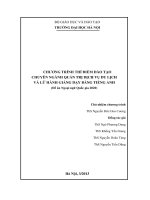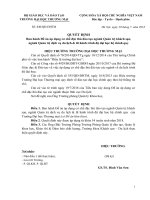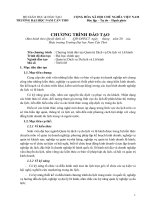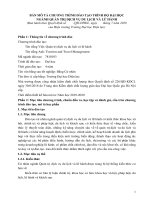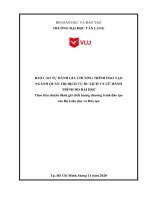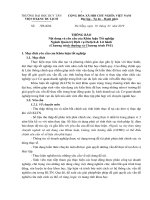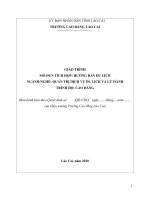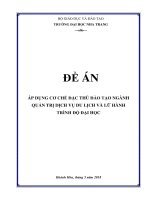Giáo trình tiếng anh chuyên ngành lữ hành hướng dẫn phần 1 lữ hành (ngành quản trị dịch vụ du lịch và lữ hành trình độ cao đẳng)
Bạn đang xem bản rút gọn của tài liệu. Xem và tải ngay bản đầy đủ của tài liệu tại đây (2.33 MB, 96 trang )
ỦY BAN NHÂN DÂN THÀNH PHỐ HÀ NỘI
TRƯỜNG CAO ĐẲNG THƯƠNG MẠI VÀ DU LỊCH HÀ NỘI
GIÁO TRÌNH
Mơn học: TIẾNG ANH CHUYÊN NGÀNH LỮ HÀNH HƯỚNG DẪN – PHẦN 1: LỮ HÀNH
Ngành:
QUẢN TRỊ DỊCH VỤ DU LỊCH VÀ LỮ HÀNH
Trình độ: CAO ĐẲNG
(Ban hành theo Quyết định số:278/QĐ-TMDL ngày 06 tháng 9 năm 2018)
HÀ NỘI, 2018
TUN BỐ BẢN QUYỀN
Tơi xin cam đoan cuốn giáo trình này do cá nhân tôi biên soạn, dựa trên
kiến thức chuyên môn của bản thân cùng với các tài liệu liên quan đến môn học
đã được liệt kê rõ ràng, chi tiết trong danh mục tài liệu tham khảo cuối giáo
trình.
Tài liệu này thuộc loại sách giáo trình nên các nguồn thơng tin có thể được
phép dùng ngun bản hoặc trích dùng cho các mục đích về đào tạo và tham
khảo.
Mọi mục đích khác mang tính lệch lạc hoặc sử dụng với mục đích kinh
doanh thiếu lành mạnh sẽ bị nghiêm cấm.
LỜI GIỚI THIỆU
Đối với các trường đại học và cao đẳng và các cơ sở đào tạo nghề, việc
giảng dạy ngoại ngữ chuyên ngành là rất cần thiết, những kiến thức này sẽ giúp
sinh viên có thể giao tiếp và vận dụng những hiểu biết chuyên ngành đã học với
các đối tác nước ngoài khi tiếp xúc hoặc làm việc với họ tại doanh nghiệp, tại
các đại lý du lịch hoặc ở bất cứ nơi nào. Hiện nay, trên thế giới tiếng Anh là
ngôn ngữ thông dụng nhất nên các giáo trình tiếng Anh chun ngành là khơng
thể thiếu , đặc biệt là đối với ngành du lịch-liên quan rất nhiều đến các đối tác là
người nước ngồi.
Giáo trình ―ENGLISH FOR TRAVEL AND TOUR GUIDING - Part 1:
Travel‖ (Tiếng Anh chuyên ngành Lữ hành hướng dẫn - Phần 1: Lữ hành) dành
cho các sinh viên đã có kiến thức về chun ngành lữ hành hướng dẫn, đã hồn
thành chương trình tiếng Anh cơ bản, có khả năng nghe, nói, đọc, viết ở trình độ
trung cấp.
Giáo trình gồm 5 bài có nội dung liên quan đến một số kiến thức chuyên
sâu về nghiệp vụ lữ hành như: điều hành tour, đặt vé máy bay, đặt phịng khách
sạn…Trong q trình biên soạn tôi đã cố gắng lựa chọn, xây dựng nội dung sao
cho sát với kiến thức chuyên ngành, phù hợp với chương trình của Nhà trường.
Nội dung chính để tơi biên soạn giáo trình này: Dựa vào một số giáo trình
Tiếng Anh Du lịch của các tác giả trong và ngoài nước trong thời gian gần đây
nhất, giúp người học thực hiện được mục tiêu giao tiếp thông thường trong công
việc, hồn thiện thêm kiến thức chun mơn nghiệp vụ bằng cách cung cấp cho
người học khả năng diễn đạt về ngôn ngữ ở 2 kỹ năng quan trọng đối với nghề
lữ hành hướng dẫn (nghe - nói), qua đây tơi xin cảm ơn Nhà trường, cảm ơn các
đồng nghiệp đã giúp đỡ và đưa ra những lời nhận xét quý báu để tơi hồn thiện
giáo trình này.
Trong q trình biên soạn giáo trình tơi đã cố gắng lựa chọn, xây dựng
nội dung sát với kiến thức chuyên ngành phù hợp với chương trình của Nhà
trường nhưng khơng thể tránh khỏi những thiếu sót, kính mong các đồng nghiệp
góp ý để tơi điều chỉnh, hồn thiện.
Xin trân trọng cảm ơn!
Chủ biên
Nguyễn Thị Hồng Hạnh
CONTENTS
Unit 1
Unit 2
Unit 3
Unit 4
Unit 5
Consolidation
People in tourism
1. Presentation
2. Reading
3. Language and practice
4. Listening
5. Speaking
6. Writing
7. Exercises
Travel agencies
1. Presentation
2. Reading
3. Language and practice
4. Listening
5. Speaking
6. Writing
7. Exercises
Tour operator
1. Presentation
2. Reading
3. Language and practice
4. Listening
5. Speaking
6. Writing
7. Exercises
Flight reservations
1. Presentation
2. Reading
3. Language and practice
4. Listening
5. Speaking
6. Writing
7. Exercises
Hotel reservations
1. Presentation
2. Reading
3. Language and practice
4. Listening
5. Speaking
6. Writing
7. Exercises
1
2
2
4
6
7
8
9
15
16
16
17
20
21
23
25
29
30
30
33
35
36
39
40
44
45
45
46
48
50
51
54
58
59
59
62
65
66
67
70
74
GIỚI THIỆU MÔN HỌC
TIẾNG ANH CHUYÊN NGÀNH LỮ HÀNH HƯỚNG DẪN
(Phần 1: Lữ hành)
Vị trí, tính chất mơn học:
- Vị trí: Mơn học được bố trí học song song mơn Nghiệp vụ Lữ hành
- Tính chất: Là mơn học bắt buộc nằm trong số môn học thuộc khối kiến thức
chuyên môn ngành Quản trị dịch vụ Du lịch và Lữ hành, hệ cao đẳng.
Mục tiêu môn học:
Kiến thức:
- Tăng cường vốn từ vựng chuyên ngành liên quan đến mảng lữ hành như: tiếp
thị các chương trình du lịch, lựa chọn điểm đến, đặt chuyến bay, đặt phòng
khách sạn...
- Cung cấp cho sinh viên các cách lựa chọn điểm đến, tiếp thị các chương trình
du lịch, cách truyền tải thông tin về du lịch tới khách, …
- Tiếp cận được những thuật ngữ chuyên ngành du lịch và hiểu được các cách
lựa chọn điểm đến, các chương trình du lịch, cách truyền tải thông tin về du
lịch tới khách,...
- Nêu được các chương trình du lịch
- Phân tích các cách truyền tải thông tin về du lịch tới khách
Kỹ năng:
- Phát triển kĩ năng đàm thoại với những chủ điểm khác nhau về các hoạt động
trong lĩnh vực lữ hành: tiếp thị các chương trình du lịch, lựa chọn điểm đến, đặt
chuyến bay, đặt phòng khách sạn...
- Vận dụng vốn từ vựng chuyên ngành kết hợp với các cấu trúc để thao tác nghề
nghiệp như: lựa chọn điểm đến, tiếp thị các chương trình du lịch, cách truyền tải
thơng tin về du lịch tới khách, đặt phòng cho khách, đặt vé máy bay cho khách...
Năng lực tự chủ và trách nhiệm:
- Rèn luyện được thái độ nghiêm túc, chăm chỉ, có kỷ luật trong cơng việc.
- Rèn tính kiên trì trong học tập, ham học hỏi và tác phong tự tin khi giao tiếp.
UNIT 1: PEOPLE IN TOURISM
Objectives
* Knowledge: Enlarge vocabulary related to jobs in tourism
Present jobs in tourism
Distinguish between present continuous and present simple
* Skills:
Listen and talk about jobs in tourism
Develop communicative skills in tourism
1
1. Presentation
1.1. What jobs do the people in the pictures do?
1.2. What is the best job in tourism in your opinion?
1.3. What jobs are available in the tourism sector?
2. Reading
2.1. Read these magazines extracts and decide which job you think is the most
interesting. Discuss your reason with the rest of the class.
Marie Blanc works in a large travel
agency in Paris. English is her only foreign
language.
I was born in Paris and I‘m very happy
her. But I like this job because I‘m
interested in travel. On the whole, this
agency deals with business customers. I
arrange their flights and hotel booking all
over the world. Apart from that, we often
get foreign tourists who want to change their
travel arrangements. Of course English is
essential. The best thing about this job? I get
cheap holidays
2
Manuel Romero works in the Tourist Information Office at Malaga airport
in the south of Spain. He speaks English and a
little French.
Most of the tourists who come here are
British, but we also have a lot of Dutch and
Germans. They usually come on package
holidays, so everything is organized in advance.
But sometimes they want to hire a car or do
something a bit different. Then I give them
advice. They usually don‘t know any Spanish, apart from ―Olé‖, so I use my
English all the time.
It‘s an interesting job and some of the people I meet are very funny. One
American couple asked if they could fly to Torremolinos. That‘s only about ten
kilometres from here!‖
Paola Conti is a tour guide in Florence. She
speaks English and Spanish.
―I take groups of English speakers –
Americans,
English, Australians on bus tours of Florence.
In the summer there are four different tours and
every time I go out somebody asks a new question,
so I never get bored. Anyway, I‘d hate to work in an office. I don‘t want to do
this for the rest of my life, but I‘m enjoying the job at the moment and I earn a
lot of money in the summer‖.
2.2. Read about Andrew Sharpe from Jamaica and answer these questions
a. When did Andrew start working in
tourism?
b. What jobs has he done in tourism?
c. What does he do now?
d. What does he think is important when you
work in tourism?
e. What does he want to do in the future?
Tourism experience
Started in tourism at the age of twelve, as an assistant in a restaurant,
trained on the Cayman Islands-one year work experience as a chef other tourism
jobs: hotel front desk, car rental supervisor, night manager of a small hotel, and
check in clerk for a charter airline.
Present job
Runs his own tour company (‗Authentic Caribbean Holidays ltd.')
3
Promotes 'Unique Jamaica' programme (adventure travel) attends trade fairs
Runs in-school programmes for Jamaican students to teach tourism
development, sustainability, and community tourism Offers internships and
work experience for university students There's so much to do in tourism. There
are many aspects: hotels, water sports, tour operation, travel agents.
What do you need to succeed in tourism?
'Working in tourism is about love for the industry. If you don't love it,
forget it. It's a people industry. It's providing service. It's people enjoying and
experiencing your culture. That's crucial. If you don't have that love, it doesn't
make sense. If you work in the industry, you've got to love it.'
What do you like about tourism?
'You get to experience different cultures, coming to Europe to see how they
operate and live. what they like ... In Europe you see something done differently
which can help you with the same procedure back home, looking at it from a
different angle. Even travelling inter-island, visiting various islands, then you
see ―OK, this island does it this way, we do it that way‖, and so forth.'
What do you do to relax?
‗As a Caribbean, part of our life is enjoyment - having fun, our music,
food, culture - it's natural for us. I play cricket. I love cricket, with friends, on
the beach, and football ...‘
What's the future for you?
'My goal is hopefully to become Minister of Tourism, Director of Tourism,
that's my main goal. You have to have a rounded knowledge of the industry,
from ground level to the top.'
3. Language study and practice
* Language study:
+ The present simple
We use the present simple to talk about facts (they stay the same for a
long time) and habits (they happen again and again).
Facts: Maria Blanc works in a travel agency.
This agency deals mainly with business customers.
Habits: Every time I go out somebody asks a new question.
They usually come on package holidays.
+ The present continuous tense
We use the present continuous tense to talk about activities happening now.
She’s diving at the moment.
+ Describing job routines
Kelly: 'I usually start at six in the morning, but this week I'm doing the
late shift.'
* Practice
4
3.1. Make sentences from these prompts. The first one has been done for you.
Example: sometimes/ want to/ hire/ car (They)
They sometimes want to hire a car.
1. Earn/ a lot of/ money/ summer (Paola)
………………………………………
2. Speak/ English/ French (Manuel)
………………………………………
3. Never/ get/ bored (Paola)
………………………………………
4. Not/ work/ Tourist Information Office (Marie)
………………………………………
5. Live/ Malaga (Manuel)
………………………………………
6. Not/ get/ cheap holidays (Paola and Manuel)
………………………………………
7. All/ speak/ English (We)
………………………………………
3.2. Now find out about your partner.
Student A: Ask questions starting Do you …? Using the prompts below.
Student B: Answer the questions with Yes, I do. or No, I don’t.
1. Get up early/ every day?
………………………………………
2. Work/ travel agency?
………………………………………
3. Often/ watch/ TV?
………………………………………
4. Speak/ Portuguese?
………………………………………
5. Sometimes/ drink/ wine?
………………………………………
6. Smoke?
………………………………………
Now ask another student about his/her partner.
Example: Does she smoke? Yes, she does.
No, she doesn’t.
3.3. Write down ten things you never/sometimes/usually/often/always do in a
normal day. Tell your partner about them.
Examples: I never eat break fast
I usually watch TV.
3.4. Write the correct form of the verb in the space provided.
1. I….. (stay) in Paris this week, but I…. (usually/live) in Madrid.
-----------------------------------------------------------------2. What…. (you/do)?
-----------------------------------------------------------------3. I‘m a tour guide. But I…. (only/work) in the summer.
5
-----------------------------------------------------------------4. Look! Those people…(learn) to ski
-----------------------------------------------------------------5. I (often/play) golf at the weekend.
-----------------------------------------------------------------6. Only a few British people …… (understand) Spanish.
-----------------------------------------------------------------7. Listen! What language… (That man/speak)?
-----------------------------------------------------------------8 Mario… (speak) three languages.
-----------------------------------------------------------------9. What….. (you/do)?
-----------------------------------------------------------------10.I……. .(wait) for a bus
-----------------------------------------------------------------3.5. Complete these sentences with the correct form of the verb in brackets.
1. I usually ____ (finish) at five, but today I ___ (work) until eight.
2. We ____ (not have) many guests outside the summer season, but a big
conference ____ (take place) this weekend, so we're very busy.
3. Some of the rooms ____ (not have) private 4 bathrooms. Which room (stay)
in, madam?
4. ____ (wait) for a call from the manager. She ____ (want) me to show some
important clients our deluxe suites. They ____ (think) of holding a business
meeting there.
5. I____ (work) with computers a lot. In fact, I ____ (do) as pedal training
course at the moment. I ____ (go) to college every Tuesday evening.
4. Listening
Three jobs (Track 1)
1. Kelly
2. John
3. Suzanna
4.1. Listen to three people talking about their jobs
+ Which job do they each have?
+ Which of them
a. enjoys working with people?
b. gets one day off a week?
c. works shifts?
d. works mainly in the back office?
e. only works part of a year?
6
4.2. Listen again and complete the extract
Extract 1
I____ 1 arrivals, hand out ____2, process enquiries and ____3, that kind of
thing. I work ____4, which can be drag. I ____5 start at six in the morning,
which is ok because I get off nice and early, but then ____ 6 I do the late turn
and I don‘t finish till after midnight- this week I ____7 the late shift.
Extract 2
I ____8 directly with the public at the desk. On a typical day, I am on the
phone and the _____9 most of the time. I _____10 the day by checking my
_____11, and that _____ 12 the agenda for the first part of the morning at least. I
have to talk to local businesses, hotels, tour companies, to check that _____13
the service they want, that we‘re stocking their brochures and so on. I also
_____ 14 presentations, and I get invited to a lot of social events to network and
talk about tourism information services in the city.
I _____ 15 on a big presentation for some Italian clients at the moment.
Extract 3
We work very _____16, especially on the changeover days. We take the
_____ 17 who are going home to the airport at six in the morning, and bring
back the new group. We then have to get them settled, sort out any _____ 18 –
and there always are problems! – and do the paperwork. So I _____ 19 until
midnight on changeover day.
5. Speaking
5.1. What questions would you ask to find out this information about the four
people?
Nationality
Age
Job
Qualities and skills
Where does he/ she come from?
------------------------------------------------------------------------------------------------------------------7
Working hours
Typical daily tasks
Things he/ she enjoys about the job
Relaxing after work
Own holiday
-----------------------------------------------------------------------------------------------------------------------------------------------------------------------------------------------
5.2. Look at the pictures. Work with a partner. Ask and answer questions.
Examples:
What does he/she do?
What are they doing?
5.3. Discuss this question with your partner:
Which three skills are most impotant for a career in tourism?
5.4. Work group of four or five students
Look at the pictures in 5.2. and think about what do they do everyday,
about the personal qualities they need.
Ask the other groups to guess which it is
6. Writing
Look at the notes below about John Hunter. Imagine you are John Hunter. Now
write about your job.
Background information
Name
: John Hunter
Job
: Representative for CampHols.
Place
: Corinthia, Austria
Languages : English only
The job
Welcomes new campers; gives advice on places to visit and things to do, keeps the
campsite clean.
Doesn‘t get much money but has plenty of free time; sometimes gets a bit lonely,
but meets a lot of interesting people.
8
My name is John Hunter. I work….
……………………………………………………………………………………
……………………………………………………………………………………
……………………………………………………………………………………
……………………………………………………………………………………
……………………………………………………………………………………
……………………………………………………………………………………
……………………………………………………………………………………
……………………………………………………………………………………
7. Exercises
7.1. Work in pairs. Take turns to be A and B.
Student A
Look at these pictures, choose a job. Do not tell your partner what it is!
Answer only Yes of No to your partner‘s questions.
Student B
Try to find out what your partner‘s job is. You may ask questions, but only
questions starting Do you…?
Example: Do you work in an office?
How many questions did you have to ask? Try again using different jobs.
7.2. Read about the people who work in the tourist industry. What are their
jobs?
Kukrit: I work in the centre of Bangkok, at Hualamphong railway station.
My job is to advise tourists about accommodation, transport, and sightseeing. It
9
takes a lot of energy-you need to be patient and friendly. I really like helping
people to have a nice time in my city, but it‘s very tiring.
Monika: I work six days a week, including evenings. In this job, you need
to be well organized and efficient. I plan the menus with the chef, handle the
day to day running of the business, do the accounts, and manage a team
of ten. The only part of the job I don‘t like is dealing with customers‘ complaints
Ramon: What I like about my job is that every day is different. I‘m part of
a team and we all get on well. I have to check guests in and out of the
hotel, take reservations, and sort out problems. I enjoy dealing with people –
except the ones who are rude. For a job like this, you need to be a sociable
person and to be diplomatic.
Alex: When I‘m on a tour, I‘m my own boss, and I really enjoy
that. You need to be calm and resourceful for this job. Basically, I‘m
responsible for making sure that the tour goes smoothly and that people
enjoy their holiday. I check what‘s happening each day, and deal with any
problems. The only negative thing is that it‘s a big responsibility.
John: When I‘m on a tour, I feel that I am dealing with the ancient
civilization. I am in charge of helping others understand and appreciate
cultural or natural heritage in many different settings - from parks,
museums and aquariums to industrial sites, interpretive centers and
botanical gardens. I have to equip my knowledge about subject matter
and I can share my interest and knowledge with others. The different
audiences make these positions interesting and stimulating. (Adapt from
―Tourism and catering, Neil Wood, workshop 2003)
A-Read and complete the notes
Job
Responsibility
Kukrit ……………………..
……………………………
Monika ……………………..
……………………………
Ramon ……………………..
……………………………
Alex
……………………..
…………………………....
John
……………………..
……………………………
B-Write the correct name
a-________
doesn‘t like dealing with complaints
b-________
likes helping people to have a nice time in his/her city
c-________
likes being his/her own boss
d-________
doesn‘t like rude people
7.3. Complete the sentences using the words in the box.
voyage tour trip cruise travel journey
1. Last year Sam went on a ___________ of Europe, and visited seven
countries in two weeks.
2. I went on a one-week __________ around the Mediterranean, on a huge
10
ship called the ―Ventura‖.
3. Last Saturday Tina went on a school _______ to London and visited the
Houses of Parliament.
4. None of Tim‘s friends enjoy _______, so he always goes on holiday
alone!
5. It was a long ________ from Cairo to Istanbul, but all the travelers
enjoyed it.
6. Our ship sailed from Australia on a long _________ that took us all the
way to Britain.
7.4. Can you spot the odd one out?
1. air, sea, bicycle
2. bikini, ice cream, shorts, sunglasses
3. towel, lotion, sand, swimming costume
4. hotel, villa, hostel, caravan
5. sunburn, sun block, suntan, sunstroke
7.5. Match a word on the left with one on the right.
1. travel
a. costume
2. sand
b. lotion
3. swimming
c. agent
4. suntan
d. trip
5. camp
e. site
6. beach
f. umbrella
7. day
g. castle
7.6. Imagine a job and think about what you do every day, about the
personal qualities you need.
7.7. Look at these jobs. What would you have to do in each one?
1. Tour assistant – Paris, London, Rome
2. Mountain expedition assistant – Himalayas
3. Field trip volunteer – Amazon
4. Assistant travel agent – busy travel agency
7.8. Read the text and answer the questions below.
Hong Kong
Hong Kong is one of the busiest, most densely-populated cities in the world
11
and an exciting tourist destination. In Hong Kong there are more than five
million citizens, mainly of Chinese descent.
Festivals
You can join the locals celebrating the Mid-Autumn Festival, the Dragon
Boat Festival, and Chinese New Year and Christmas, as well as enjoying
hundreds of other annual cultural events.
Dining
Hong Kong offers a greater variety of international cuisine than any other
city in the world. There are over six thousand restaurants out there waiting to
welcome you, and you won't be disappointed.
Views
Hong Kong is also a city of views. On a clear day you can see as far as
Macau on the other side of the bay. A day-trip to Macau is a wonderful
diversion and should not be missed.
Shopping
Hong Kong is beyond doubt a shoppers' paradise because of the excellent
value for money and quality of the products. Most shops and markets are open
seven days a week.
Answer the following questions about Hong Kong in full sentences.
1. What is the population of Hong Kong?
2. How many cultural events are there every year?
3. Where can people go for a good day-trip from Hong Kong?
4. Is there good shopping in Hong Kong? If so, why is it good?
5. Are the shops and markets open every day?
6. Does Hong Kong sound like an interesting place to you? Why? Discuss
this with a colleague and write down some good and not so good points.
.................................................................................................................................
.................................................................................................................................
.................................................................................................................................
.................................................................................................................................
.................................................................................................................................
.................................................................................................................................
.................................................................................................................................
.................................................................................................................................
.................................................................................................................................
.................................................................................................................................
.................................................................................................................................
12
7.9. Read the text and answer the following questions
An optimist’s view of tourism’s future
One does not have to be an optimist to believe that international tourism
will grow substantially over this century. As tourism has expanded in the latter
half of the twentieth century it has been accused of many things: despoiler of
environments, destroyer of cultures and exploiter of poor nations. Tourism, it is
claimed, ultimately destroys the attractive features of a place and thus can
neither sustain its resource base nor itself as an industry in the long term.
It is possible, however, to regard tourism‘s future growth as not only
assured but also highly desirable. Tourism will continue to grow, the challenges
consequently presented can be met, and the ultimate outcome will be positive,
depending on how well both the tourism industry and governments respond to
those challenges. A glance at the recent past reveals a remarkable increase in
international tourist arrivals from 25 million in 1950 to 664 million in 1999, an
average annual growth rate of 7%. By 2020 international arrivals are predicted
to reach 1.18 billion, representing an average annual growth rate of 4.1%. Such
forecasts seem reasonable given the likelihood that the forces driving past
growth will continue for the foreseeable future: faster, larger aircraft leading to
lower real travel costs; more widespread wealth in a greater number of
countries; reduction of barriers to travel imposed by nations on their own
citizens and visitors; the globalisation of media raising people‘s awareness of
the world outside their own domains and raising their interest in experiencing
other places. Consequently, by the end of the 21st century it is highly likely that
more people will travel more often to a wider range of international destinations.
There are, however, reasons to believe that this future will not be realised.
One of the greatest uncertainties lies in at least maintaining the current
historically low cost of international travel. With plans well advanced for the
introduction of larger and more fuel-efficient aircraft the medium-term outlook
is promising, but looking into the future there must be concerns about the
increasing scarcity of oil.
Technological developments such as the Internet and virtual reality may
reduce the need or desire to travel. This notion can be summarily dismissed by
considering the nature of the tourism experience and what motivates it. Tourism,
in essence, is sensual, emotive and driven by a desire to experience a different
place in more than two dimensions. Moreover, the Internet cannot provide the
surprise discoveries, sense of adventure and chance encounters that real travel
affords. It is more likely that the greater awareness of other places engendered
by information technology will stimulate a desire to authenticate by direct
experience.
Far more difficult to challenge is the claim that tourism is ultimately
unsustainable because of its impacts on environments and cultures that then
make destinations less appealing. Less developed nations are particularly
vulnerable. They possess environmental and cultural features that tourists wish
to experience, given the right conditions. They also possess a powerful
13
economic incentive to develop tourism rapidly and with as few constraints as
possible. They lack capital to achieve this and consequently have frequently
granted control of tourism development to foreign interests. To attract capital
they have offered concessions – tax breaks, liberal access to land and low
environmental standards - which ultimately reduce the benefits. There is no easy
solution to this dilemma, but ironically it may lie in the growth of tourism itself.
The combination of a growing market, increasing diversification and rising
levels of experience amongst tourists will lead to the industry constantly seeking
new destinations.
1. Answer the following questions
a. What is this article about?
___________________________________________________________
b. What are the negative factors connected with the development of tourism
in the underdeveloped countries, and what solutions may be suggested
according to the author?
___________________________________________________________
___________________________________________________________
2. True/ False
a. Faster aircrafts contribute to an increase in travel costs
b. There are growing concerns over the attainability of oil around the world
c. It is a recognized fact that the increased power of the Internet will induce
people to wish to travel less
d. Less developed nation tend to devolve the management of their tourism
industry to foreign interests and capitals
3. What does the following number refer to?
4.1%: _______
4. Give at least 3 synonyms of the noun GROWTH:
----------------------------------------------------------------------------------------------------------------------------------------------
14
UNIT 2: TRAVEL AGENCIES
Objectives
* Knowledge: Use some useful phrases for answering the telephone and
using the telephone effectively.
Distinguish between ―will‖ and ―going to‖
* Skills:
Practise 4 skills related to services of travel agency
1. Presentation
1.1. Name some famous travel agencies in your country
1.2. Which travel agency sells more holidays?
1.2. What kinds of holiday do travel agencies sell?
2. Reading
SIX STEPS TO SUCCESSFUL SELLING
Your job as a travel agency sales consultant is to help your customers to
choose their next holiday. This is a skilled job, and in order to do it well, you
need to follow an established routine called the sales process. The sales process
15
